Israel’s government is reportedly preparing to send troops into Gaza, which will change the underlying nature of the conflict. With the Israelis asking the inhabitants of northern Gaza to move south, what may be taking shape is a strategy in which Israeli forces gradually push Hamas into a corner of Gaza, much as they did with the Palestine Liberation Organization in West Beirut in 1982, and begin a process of negotiations for the evacuation of its leadership. This will almost certainly lead to Hezbollah’s opening up a front in Israel’s north and on the Golan Heights, as Iran’s foreign minister underlined on Thursday in Beirut.
How, then, might the conflict spread to the Middle East? Let’s imagine a scenario in which Hamas is terminally threatened in Gaza. Iran and Hezbollah would ignite the Lebanese and Golan fronts in order to distract the Israelis. They would probably also ask Iraqi militias to deploy to Syria or Lebanon in order to bolster Hezbollah—and these militias have been preparing precisely for such a moment. This could lead Israel to bomb them in Syria, and perhaps even inside Iraq. But more importantly for the Iranians, U.S. forces are present along the Syrian-Iraqi border and may intervene as well to prevent any reinforcement of Hezbollah on the part of the Iraqi militias, or even Iranians. Equally objectionable to Tehran, the United States has dispatched two carrier groups to the Eastern Mediterranean, indicating that the Biden administration will not allow the so-called Resistance Axis to expand the war against Israel. As the National Security Council’s spokesman John Kirby put it, “We’re sending a loud and clear message: The United States is ready to take action should any actor hostile to Israel consider trying to escalate or widen this war.”
So, all the pieces are in place for a major explosion in the Middle East: an Israeli government that is determined to end Hamas’ presence in Gaza; a Resistance Axis that will almost certainly intervene from Lebanon and Syria to preserve its deterrence capability, as well as to protect Hamas, which has become a major Iranian political-military asset in the region; a United States that is determined to defend Israel at all costs, which means that Iran itself may have to become directly involved in the conflict to preserve its regional sway.
Yet if Iran had a choice, it would probably prefer not to thrust Hezbollah into a war against Israel and the United States, as this risks seriously impairing Tehran’s major regional proxy force. Also, no one ever mentions the domestic Lebanese scene, but if Lebanon is devastated, as the country would surely be, Hezbollah’s dominance nationally could be profoundly shaken. Coupled with the defeat of Hamas in Gaza, this could create a situation in which the Resistance Axis loses many of the gains it secured in the last decade, even if it is not decisively defeated.
Israel, too, does not appear keen to widen the war to the north, let alone enter into battle with Iran. Its focus, for now, is on annihilating Hamas. However, if the Israelis feel that the Americans will back them militarily, it’s not inconceivable they may choose to go all out and try to resolve their Hezbollah and Iran problems, provided Hezbollah crosses the accepted “red lines” in the north by bombing Israeli cities and strategic targets. However, the risks in this choice are many. Israel could suffer major destruction and loss of life, and most importantly it is highly probable that no side could win a clear-cut victory.
What about the United States? It too appears dead set on averting a regional war. The Biden administration is no different than the Obama and Trump administrations in wanting to avoid new military adventures in the Middle East, especially when the United States is about to enter an election year. That said, bolstering Israel is a popular step among Americans, especially when they believe that the threat Israel faces today is existential in nature. Therefore, if Iran and its proxies, to lend credence to the positions into which they have locked themselves, expand the war against Israel, the United States, to lend credence to the position into which it has locked itself, will have to attack them.
Is there a diplomatic way out of the looming mess, and who can provide it? It’s difficult to say. Again, the parties are so tied down to adamant positions, to which they’ve appended moral justifications, that there doesn’t appear to be much room for compromise. Still, two Arab countries are able to play potentially important roles: Qatar, which can carry messages between the Americans (and through them, the Israelis) and Iran; and Egypt, which will have a major role in any effort to define a new political order for Gaza that satisfies Israel.
But for now, all this may be premature. There are potential offramps for the parties to avoid going all the way in a war. Hezbollah and Iran’s other allies can limit their actions to the broad border zone, tying down Israeli troops but not crossing the threshold of bombing Israeli strategic targets and cities. Or, if Israel advances in a piecemeal fashion in Gaza, negotiating as it does so, the interplay of negotiations and gradual military gains may make it more difficult for Iran to undermine the process by ordering Hezbollah into a war. Or, Hezbollah can wait to see how Hamas is faring in Gaza, and if it determines that the organization is holding its own, it could decide to limit its response to Israeli actions and avoid the worst.
Until the Israelis enter Gaza, the discussion is theoretical, since all sides are waiting to see what the other side does. This may be the calm before the storm. Let’s hope there are ways of making the storm dissipate before it washes the region away.

